
Introduction
The two major centers of the cryptocurrency market in Asia are Hong Kong and Singapore. Due to its close relationship with China and a relatively independent governance environment, Hong Kong has become the center of the cryptocurrency market for the Chinese community, a regulatory benchmark, and the strongest hub for information exchange.
With the prosperity of the cryptocurrency market in the previous cycle, an increasing number of people in the Asia-Pacific region have set their sights on the cryptocurrency field radiating from Hong Kong. Many institutional and individual investors are eager to try their hand. In 2021, the unclear policies in Hong Kong led to a large amount of capital and institutions migrating to cryptocurrency-friendly regions such as Singapore, Dubai, and the United States. With the Hong Kong government's official announcement of the opening and accommodation of the Crypto market in 2022, many capitals have started to return, and the overall market situation has become more prosperous.
Rather than being called the Hong Kong market, it is more like a market at the center of the Chinese community. From a human relationship perspective, Hong Kong has close connections with Macau and Taiwan. However, in reality, Southeast Asia, South Asia, and even the entire Asia are within the radiation range of Hong Kong. Therefore, Hong Kong's connectivity and influence play an extremely important role in the cryptocurrency market.
1. Macroeconomic Indicators and Current Situation
1.1 Geographic Location and Population Size

Hong Kong was once a British colony and is now a special administrative region of China. It is located in the south of China, east of the Pearl River Estuary, facing Macau across the sea to the west, adjacent to Shenzhen to the north, and bordered by the Wanshan Islands of Zhuhai to the south. The area includes Hong Kong Island, Kowloon, the New Territories, and 262 surrounding islands, with a land area of 1,113.76 square kilometers and a sea area of 1,641.21 square kilometers, totaling 2,754.97 square kilometers.
As of the end of 2023, the total population of Hong Kong was 7.5031 million, making it one of the most densely populated areas in the world. It has the highest life expectancy globally and ranks fourth in the Human Development Index. The majority of the population in Hong Kong holds Chinese nationality. According to 2017 statistics, Chinese nationals account for approximately 91.4% of the population in Hong Kong. Other nationalities mainly include the Philippines (about 190,000, 2.6%), Indonesia (about 170,000, 2.3%), and India (about 33,000, 0.4%).
1.2 Economic Structure and Characteristics
Hong Kong is ranked third as a world-class city by GaWC. Its economy is highly dependent on a free-market economic system driven by international trade. As the economy with the highest dominance in the global service industry, Hong Kong's economy is characterized by four traditional main industries: financial services, trade and logistics, professional services and other business support services, and tourism.
As one of the most important financial centers and commercial ports in the world, Hong Kong is characterized by low taxation, minimal government market intervention, and a mature international financial market. It is known as "Nylonkong" alongside New York and London, ranking as the world's third-largest financial center. It is also a significant international trade, shipping, and innovation and technology center. Hong Kong International Airport had the highest international cargo volume in 2022, and Hong Kong's port ranks ninth in terms of container throughput globally.
Furthermore, Hong Kong has a very high concentration of wealth, with a large wage gap. 90% of earners receive 41% of all income. In Hong Kong, there is one millionaire for every 109,657 people, making it the city with the second-highest number of millionaires in the world and the city with the most millionaires in Asia. It is also the city with the most concentrated ultra-high net worth individuals in the world. Despite government efforts to narrow the widening gap, the median income of the top 10% of earners is 44 times that of the lowest 10%.
1.3 Latest Annual GDP Growth of 3.2%
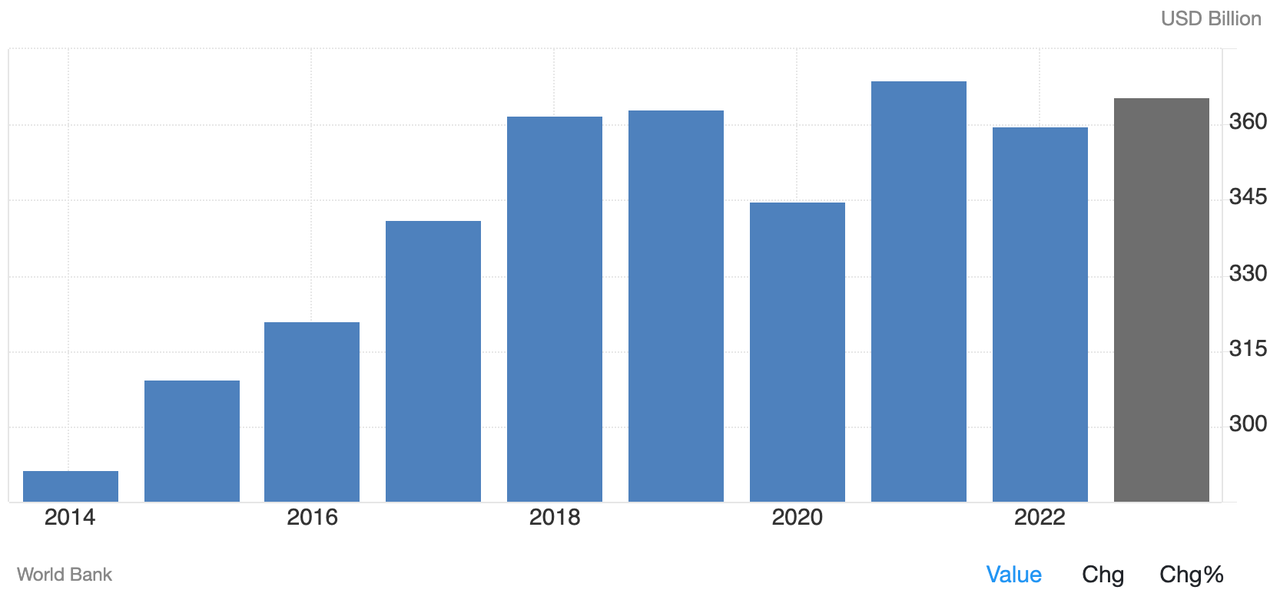
Hong Kong is the world's 35th largest economy. According to official data from the World Bank, Hong Kong's Gross Domestic Product (GDP) was $359.84 billion in 2022, accounting for 0.15% of the global economy.
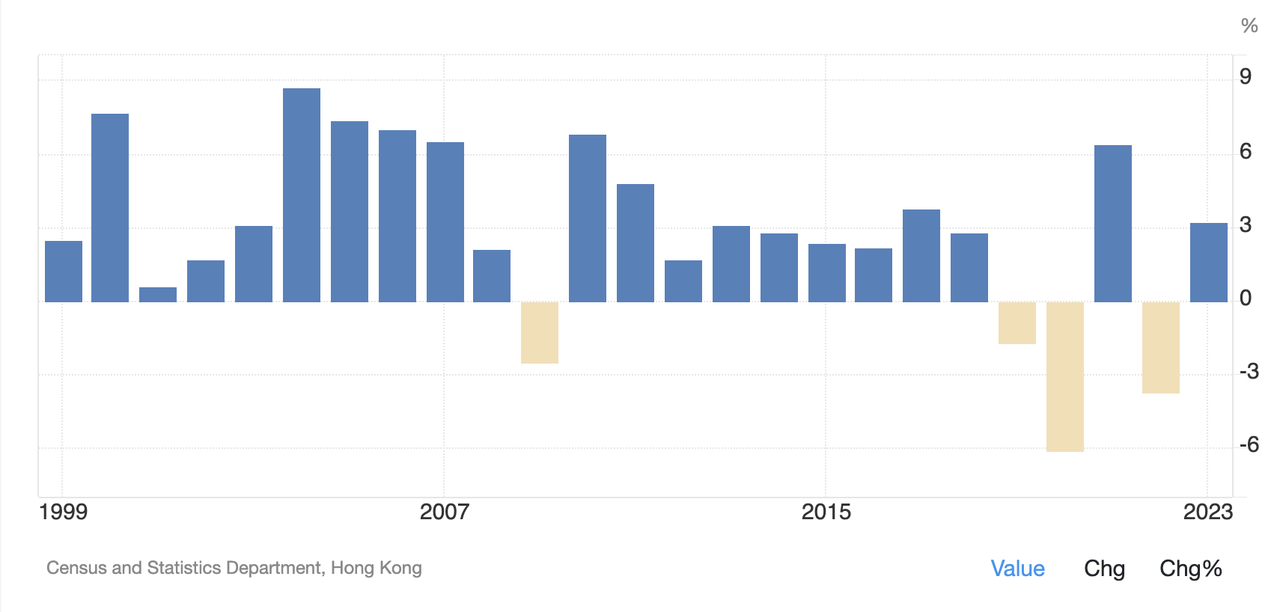
In 2023, based on the preliminary figures of the local Gross Domestic Product calculated by the Census and Statistics Department of the Hong Kong Special Administrative Region by economic activity, with strong rebounds in service exports and fixed investment, as well as significant growth in private consumption, the real Gross Domestic Product in Hong Kong increased by 4.3% in the fourth quarter of 2023 compared to the same period of the previous year. Comparing the whole year of 2023 with 2022, the real Gross Domestic Product increased by 3.2%.
1.4 Slight Increase in Inflation Rate but Below Expectations
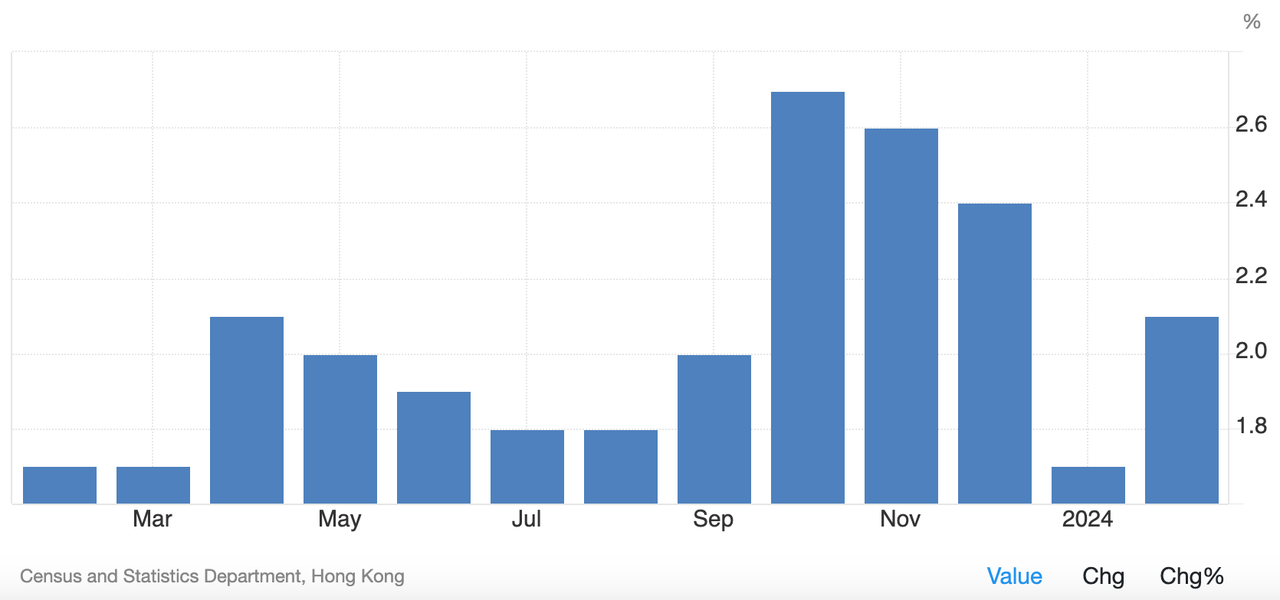
In February 2024, Hong Kong's annual inflation rate rose to 2.1%, slightly lower than the market's expected 2.2%. Prices of food (2.2%), housing (3%), transportation (2.3%), and other services (3.6%) increased, while prices of clothing and footwear (1.3%) and other goods (1%) slowed down. The costs of electricity, gas, and water (-7.8%) and durable goods (-1.4%) continued to decline. The core inflation rate also increased to 1.2% compared to the previous 0.8%.
The Hong Kong government stated that the basic consumer price inflation rate remained moderate in the first two months of this year. Despite the continued relatively rapid rise in dining out and takeaway prices, basic food prices fell year-on-year, energy-related item prices further decreased, and other major components continued to be largely under control. Although local costs may face some upward pressure as the economy continues to grow, external price pressures are expected to further ease.
1.5 Legal Tender of Hong Kong
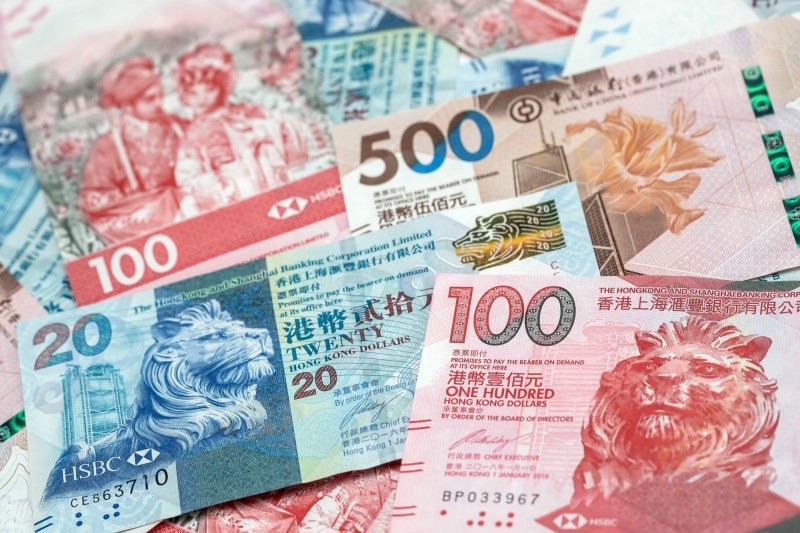
The Hong Kong Dollar (HKD) is the legal tender of Hong Kong, originally known as the "Hong Kong Dollar" (unit: dollar), also known as the "Hong Kong Dollar" or "Hong Kong Paper," with the currency and fund code as HKD and the symbol as HK$. The Hong Kong Dollar is issued and regulated by the Hong Kong Monetary Authority (HKMA). The currency is pegged to the US Dollar (USD) with a narrow floating range. The Hong Kong Dollar is widely used in daily transactions in Hong Kong and is also accepted in the neighboring Macau.
2. Current Situation and Characteristics of the Cryptocurrency Market
As a special administrative region of China, Hong Kong has autonomy in many aspects of its policies, including the regulation of cryptocurrencies. Unlike China, which completely prohibits cryptocurrencies, they are allowed in Hong Kong, and since 2023, it has been explicitly encouraged for the cryptocurrency industry to settle and develop in Hong Kong, under the condition of regulatory compliance.
At the same time, Hong Kong's unique cryptocurrency market provides a variety of use cases, suitable not only for local users but also for foreigners. According to professional analysis, based on Hong Kong's relatively independent judicial environment and its role in the global economy, this may indicate that the Chinese government is reversing the development direction of digital assets, or at least becoming more open to cryptocurrency initiatives.
2.1 Global 5th Highest Cryptocurrency Adoption Rate
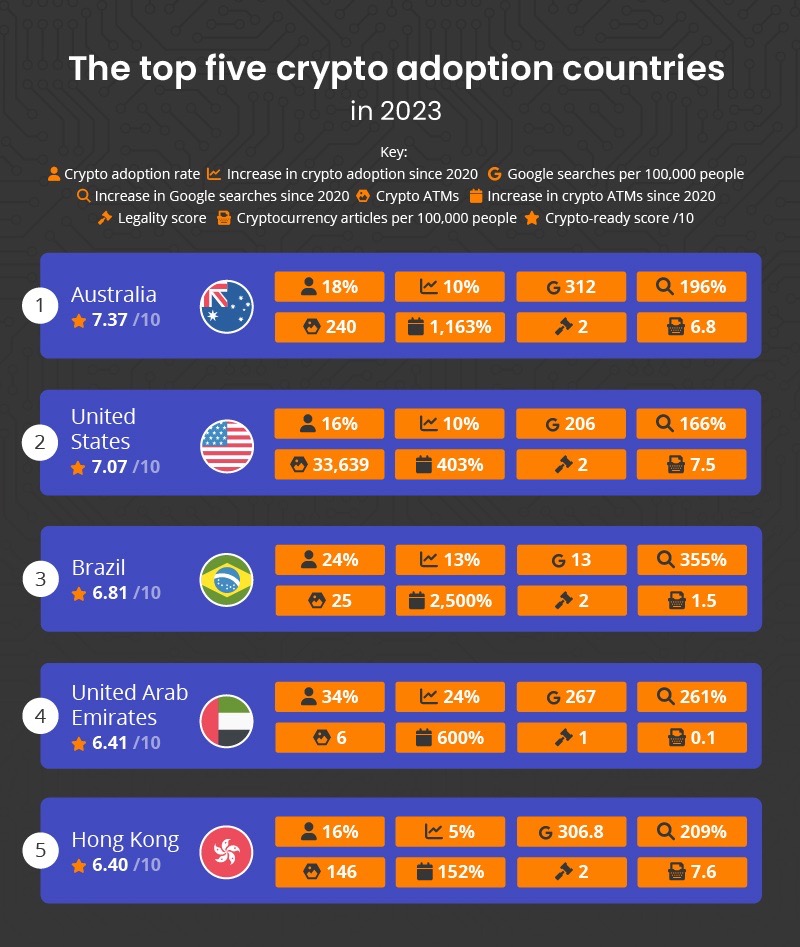
In a cryptocurrency adoption report by Finder, Hong Kong in the Asia region has the highest cryptocurrency adoption rate, ranking in the top 5 globally. In 2022, the cryptocurrency adoption rate was 16%, with a 209% increase in cryptocurrency searches and 7.6 cryptocurrency-related articles published per 100,000 people. Additionally, cryptocurrency ATMs increased by 152%.
2.2 Cryptocurrency Receipt Volume Ranks 5th in East Asia
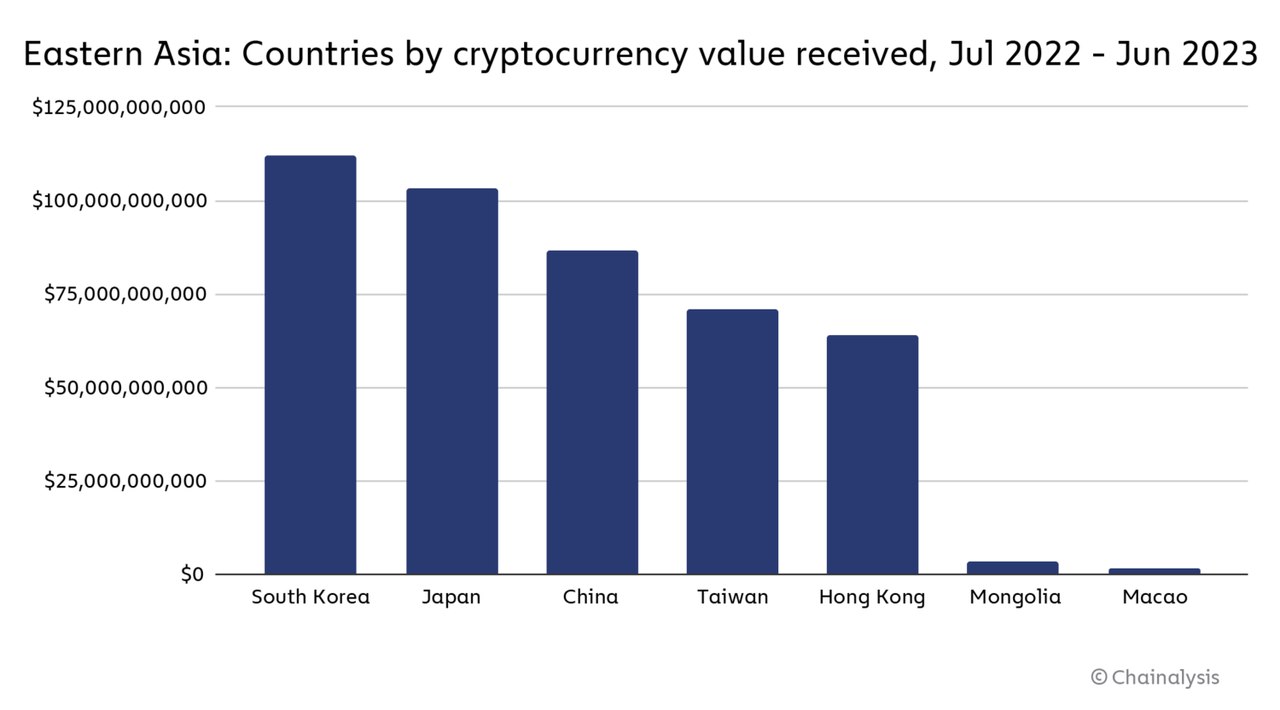
According to a report by Chainalysis, Hong Kong is a very active cryptocurrency market, estimated to have received $64 billion in cryptocurrency between July 2022 and June 2023. Despite Hong Kong's population accounting for only 0.5% of mainland China, this amount is impressive compared to China's $864 billion during the same period.
It is important to note that Hong Kong's population base and industry structure replicate its model and framework as a top 3 global financial center in the cryptocurrency field, similar to Singapore and London, but with significant differences from Dubai, Turkey, and even the United States.
2.3 OTC Trading Type is Significantly Growing
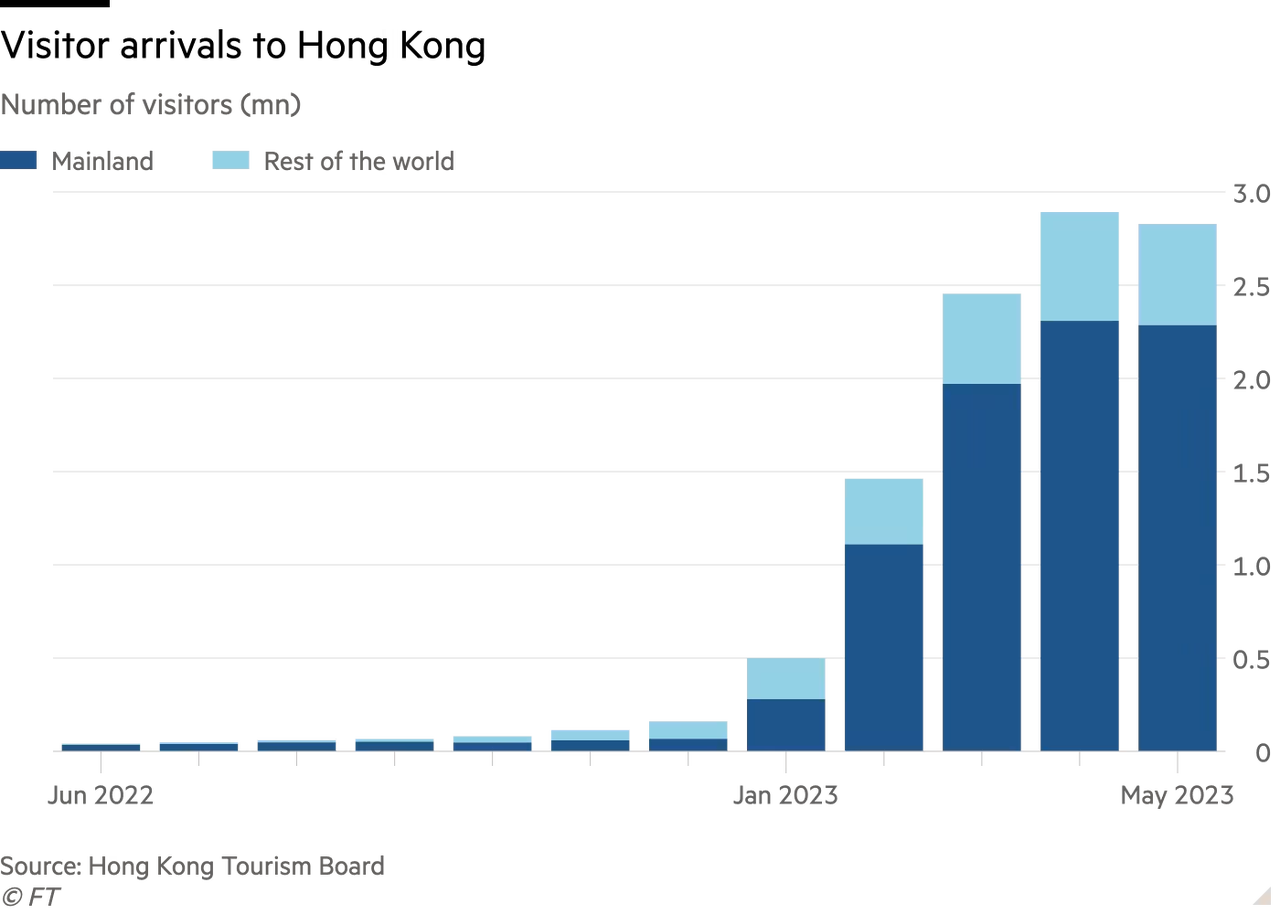
Looking at visitor data to Hong Kong, with the decline of the COVID-19 pandemic, there has been a rapid increase in visitors to Hong Kong since early 2023, with the China region accounting for approximately 80%. Coupled with the government's efforts to create a favorable business environment for the cryptocurrency industry, OTC trading grew by about 25% in the first half of 2023, with continued significant growth expected in the next 2-5 years, according to data from Crypto entity stores and feedback from industry professionals.
2.4 Large Institution Transactions Rank Top 1
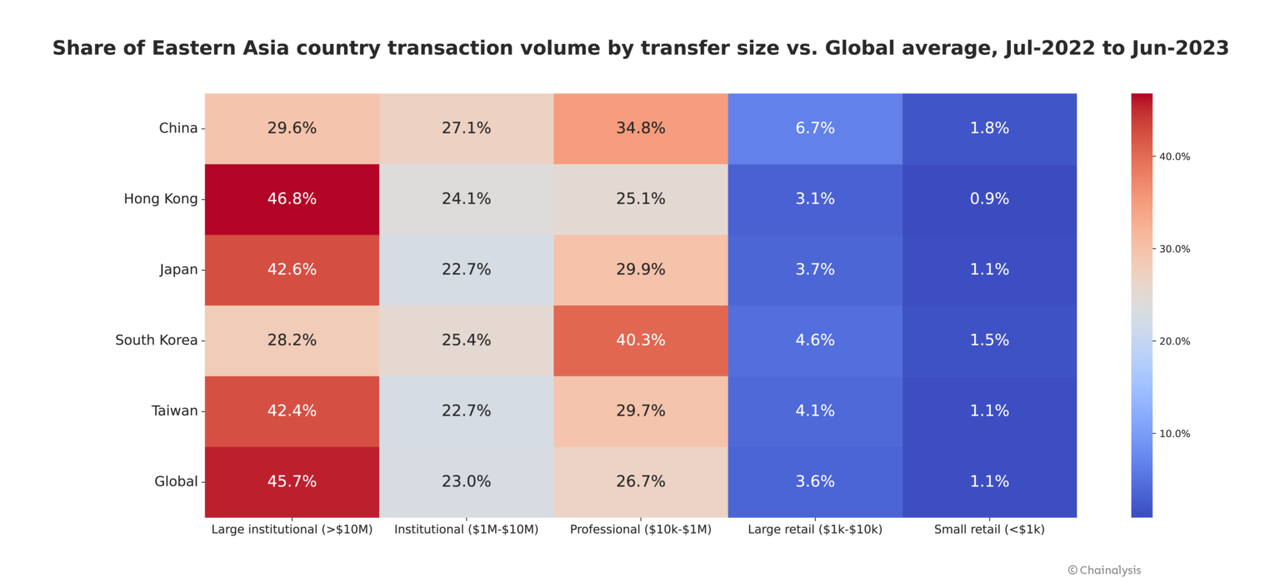
In terms of transaction volume, large institution transactions account for a larger share of the trading volume, with Hong Kong ranking first at 46.8% for transfers exceeding $10 million, higher than the global average of 45.7%. Retail-type transfers are slightly lower than the global average. Most of this is driven by Hong Kong's very active OTC trading market, which typically caters to institutional investors and high-net-worth individuals.
2.5 DEX Trading Far Exceeds Global Average
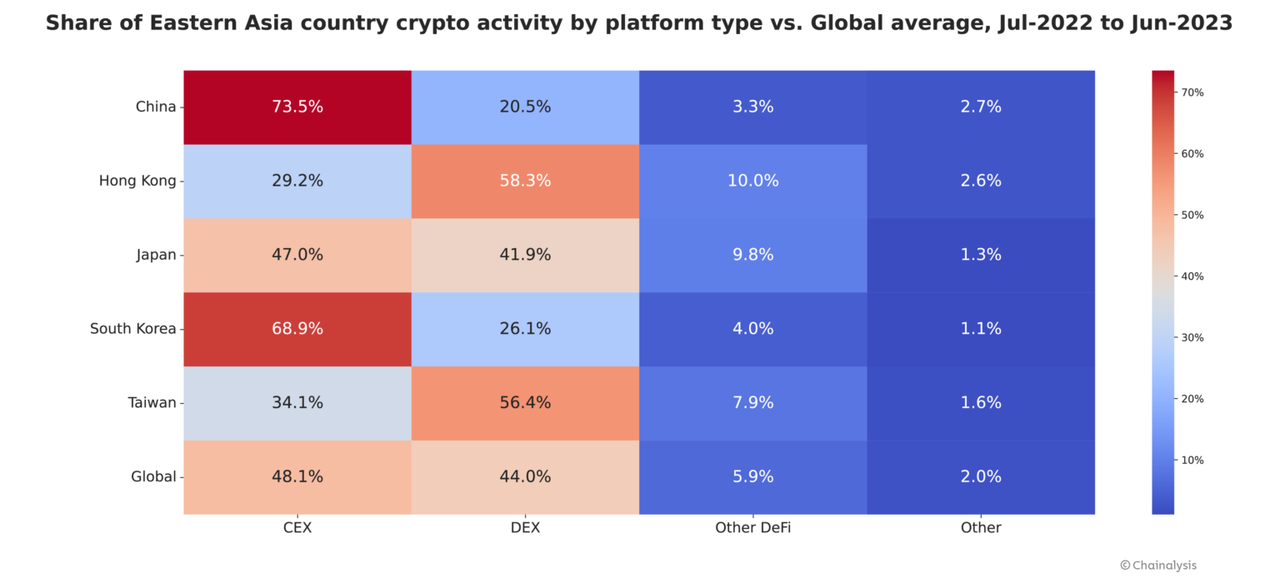
Compared to other regions in East Asia, Hong Kong shows unique segmentation in the most commonly used cryptocurrency platform types, especially with a significantly higher proportion in DEX, exceeding Taiwan by 2 percentage points and the global average by approximately 14 percentage points. The main reason is the higher proportion of OTC trading.
3. Characteristics of Cryptocurrency Users
In Hong Kong, the exact number of cryptocurrency owners is difficult to determine, but it is certain that more individuals and businesses are participating in cryptocurrency trading, investment, and blockchain technology development.
3.1 Users Seeking Short-Term Gains Account for 75%
According to the Investment Committee's "2023 Retail Investor Research," 75% of surveyed virtual asset investors pursue short-term gains. Additionally, 74% of cryptocurrency investors believe in the enduring trend of virtual assets, while 73% are concerned about missing profitable opportunities.
In other words, despite investors having good financial knowledge, there is a need to strengthen their financial behavior. The disconnect between knowledge and practical application highlights the importance of a comprehensive investment strategy approach.
3.2 BTC Ownership Rate at 18%, the Highest Globally
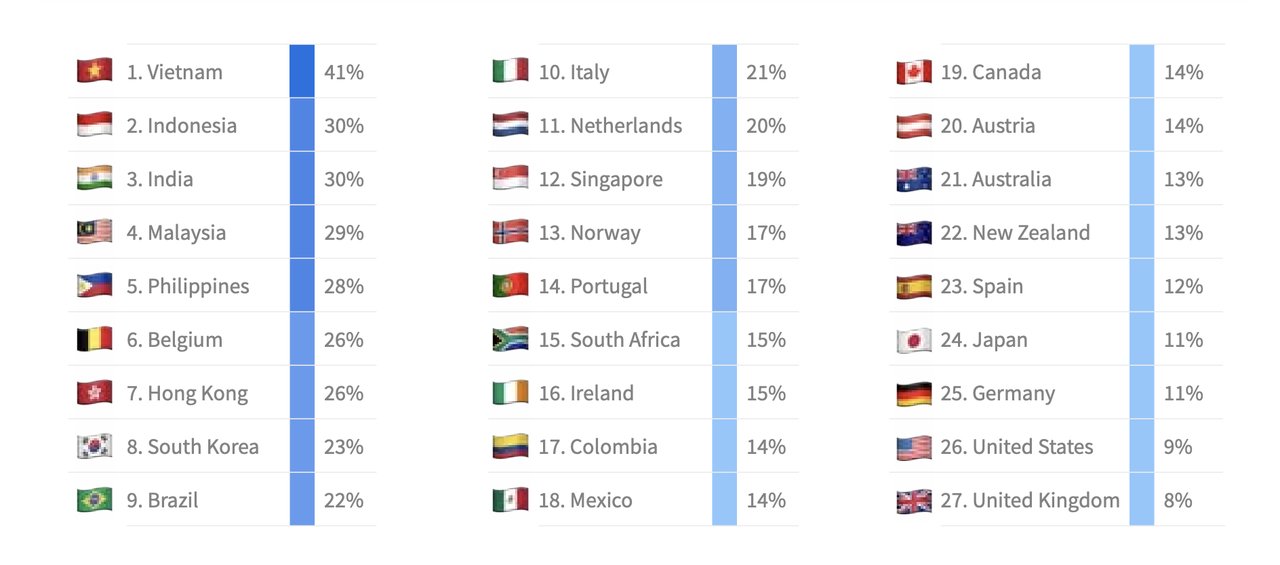
In a cryptocurrency adoption report by Finder, the top 5 are all in Asia, with Hong Kong residents having a 26% ownership rate of cryptocurrency assets. Considering Hong Kong's status as a global financial center, this number is not surprising. In fact, Hong Kong has the highest Bitcoin ownership rate at 18%, ranking second globally, only behind Vietnam (20%).
3.3 Generation Z is the Main Group of Cryptocurrency Users
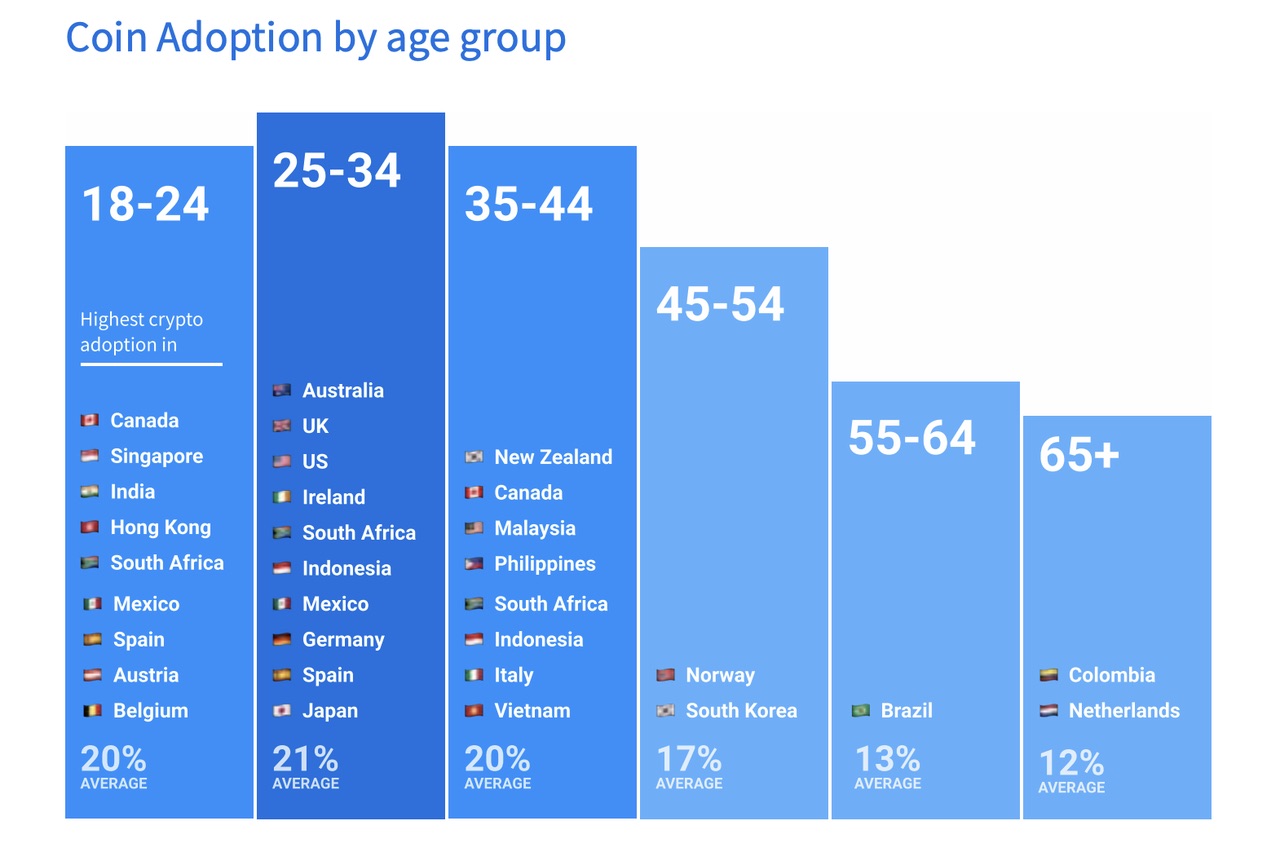
In terms of age groups, individuals aged 18-24 are most likely to own cryptocurrency, at 35%, followed by 30% for those aged 35-44, 28% for those aged 25-34, a high 23% for those aged 65 and above, 19% for those aged 55-64, and 16% for those aged 45-54.
Cryptocurrency users in Hong Kong are mainly concentrated in Generation Z, with a high ownership rate, consistent with a study on investment preferences of Generation Z at Hong Kong University. Compared to older age groups, Generation Z in Hong Kong has a clearer understanding of the importance of financial management, with higher bank deposit rates and higher investment and ownership rates of cryptocurrency assets.
3.4 Male Users Dominate the Cryptocurrency User Base
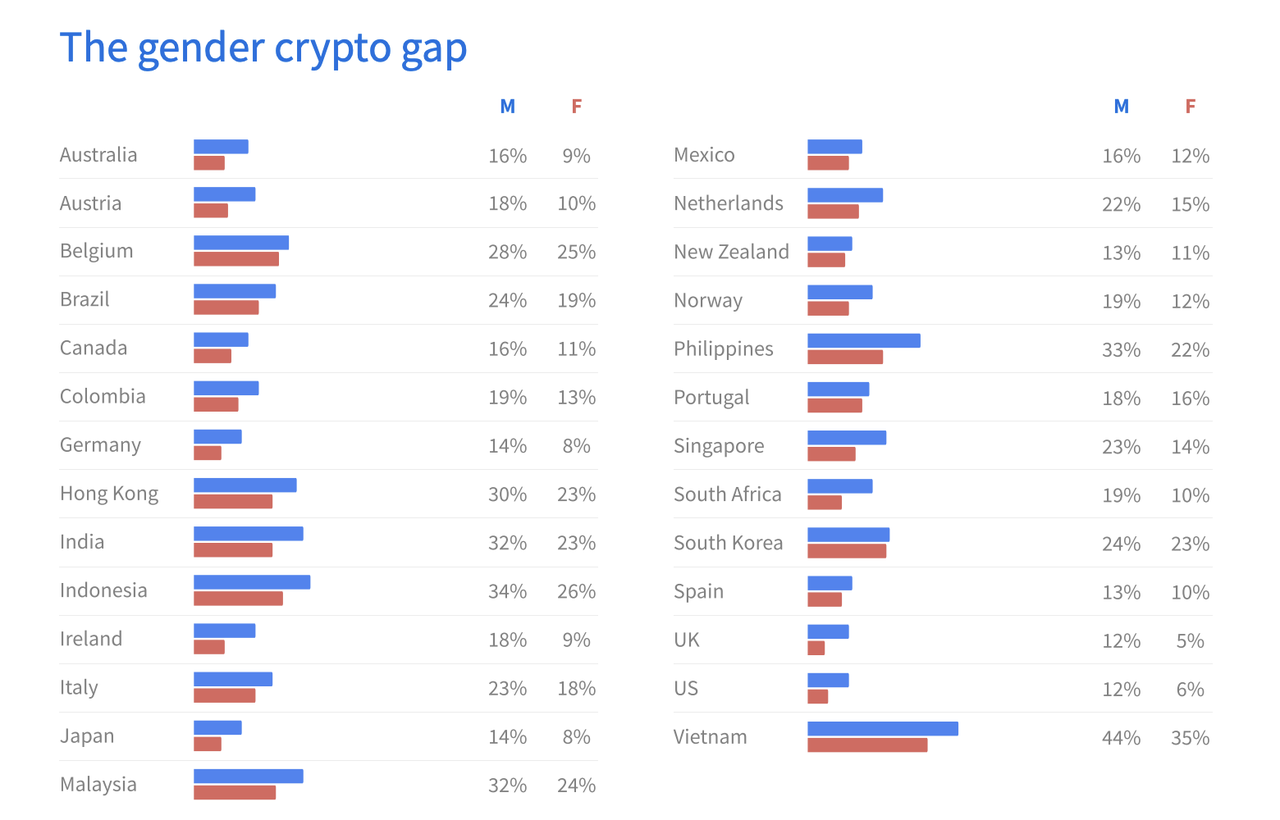
From a gender perspective, Hong Kong follows the global trend, with more male users in the cryptocurrency user base. In Hong Kong, male holders of cryptocurrency account for 30%, while the female proportion is 23%. The main reasons are the relatively higher income of males and their stronger interest in cryptocurrency and Web3.
4. Current Status of CEX in Hong Kong
According to the regulations of the Securities and Futures Commission of Hong Kong, cryptocurrency platforms operating in Hong Kong must submit a licensing application by the end of March, or they will be required to cease operations.
4.1 CEX with Authorized Trading Licenses

Since the official launch of its licensing system in 2023, the Securities and Futures Commission of Hong Kong's website shows that only OSL and HashKey have obtained cryptocurrency trading license authorization. As of 2024, the Securities and Futures Commission of Hong Kong has received license applications for CEX operations from 22 companies, including OKX, Bybit, Bullish, Crypto.com, Huobi HK, and Matrixport HK.
OSL focuses on B-end brokerage and trading services
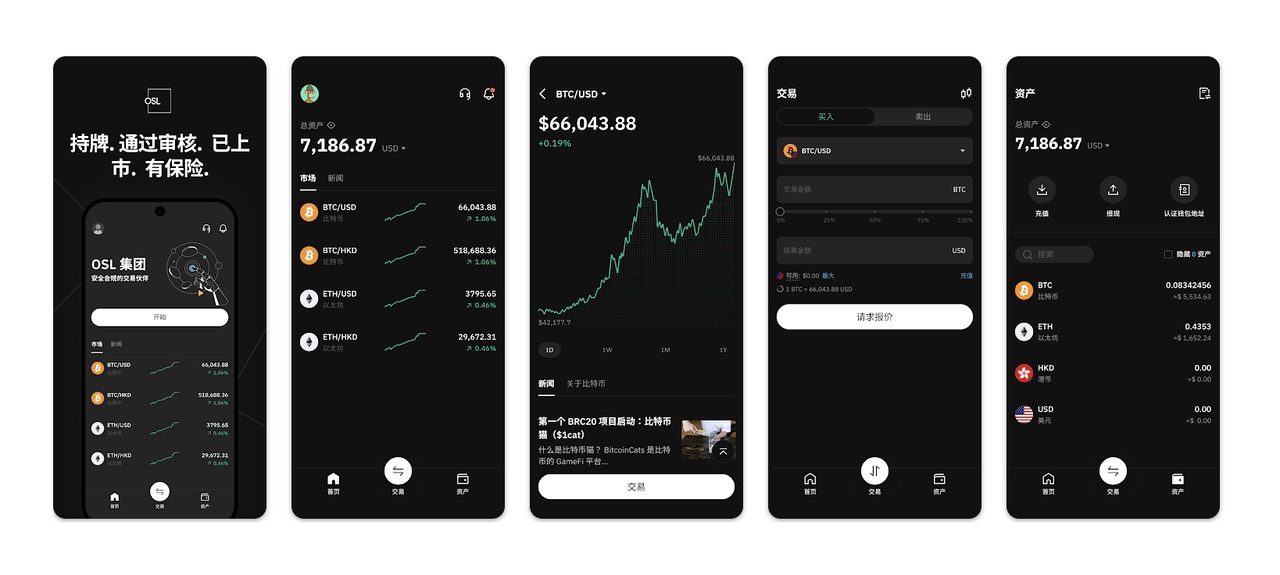
OSL is a Hong Kong-based digital asset brokerage and cryptocurrency exchange. Its full name is "Olympus Markets Limited." OSL provides over-the-counter trading, custody, main brokerage services for digital assets, and related SaaS services for institutions and professional investors. It mainly focuses on providing services for bulk brokerage and API tools for clients, and its mobile app is available on the Apple App Store and Google Store in the Hong Kong region.
The mid-year report of BC Technology in 2023 showed that the net loss decreased from HK$300 million to HK$95 million in the six months ending in June, with OSL's digital asset and blockchain platform business playing a key role in BC Technology's revenue.
HashKey, a Compliant Native Cryptocurrency CEX
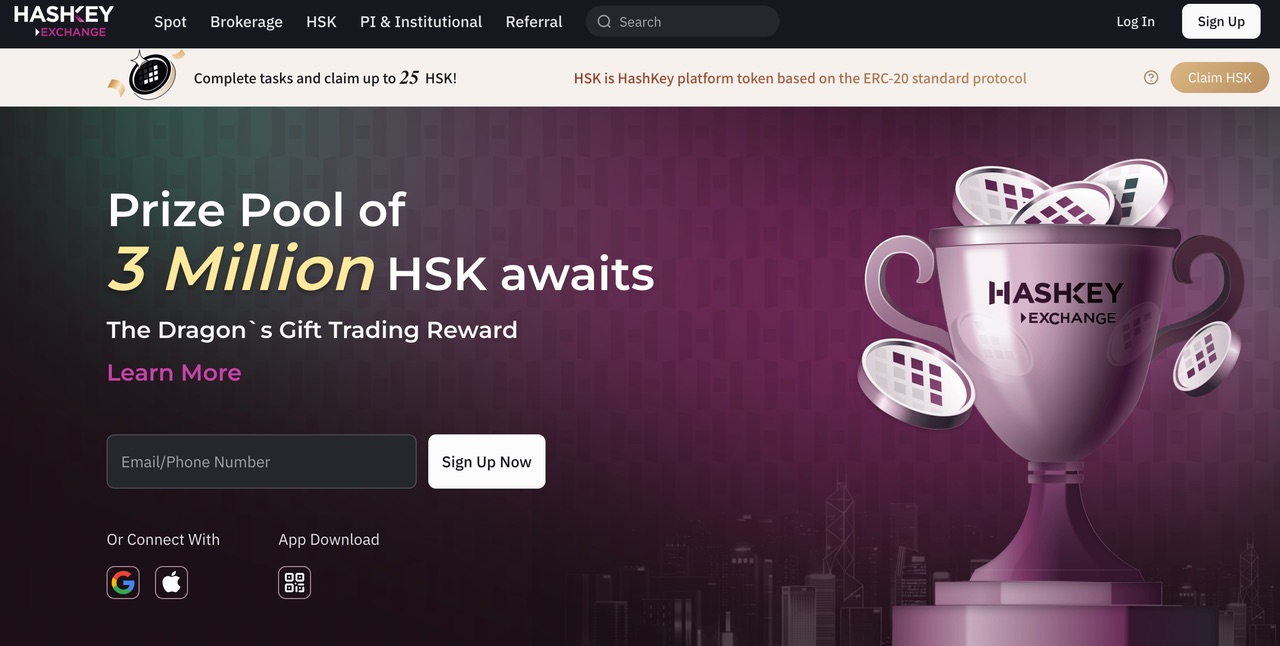
HashKey Exchange is a cryptocurrency exchange based in Hong Kong. It is licensed by the Securities and Futures Commission of Hong Kong and is one of the platforms operating legally in the region. HashKey Exchange provides a platform for users to buy, sell, and trade various cryptocurrencies, offering spot trading, derivative trading, and custody solutions. It aims to provide a secure and compliant environment for cryptocurrency trading in Hong Kong and other regions.
4.2 CEX Listed on the Watchlist
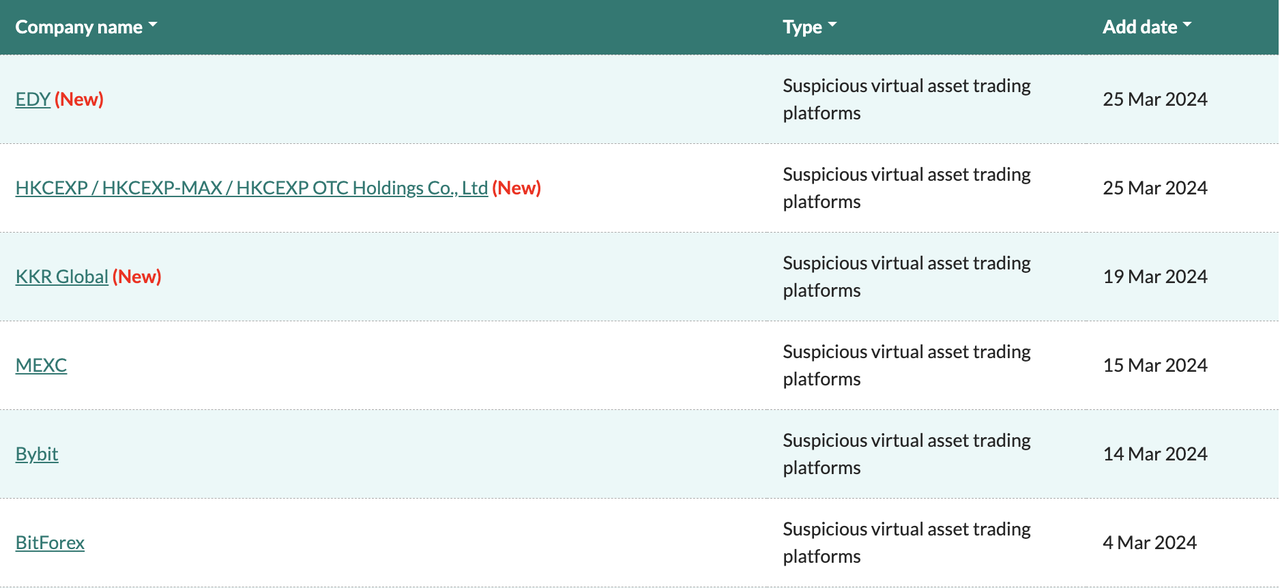
The Securities and Futures Commission of Hong Kong has publicly listed CEX entities that operate without a license and are considered to have targeted Hong Kong investors or claimed to have connections with Hong Kong. Currently, there are 23 entries in the list, including MEXC and Bybit.
4.3 Other CEX Used by Users
In addition to the compliant OSL and HashKey, several other CEX platforms are actively used by Hong Kong users, most of which are actively applying for the necessary licensing authorization.
OKX
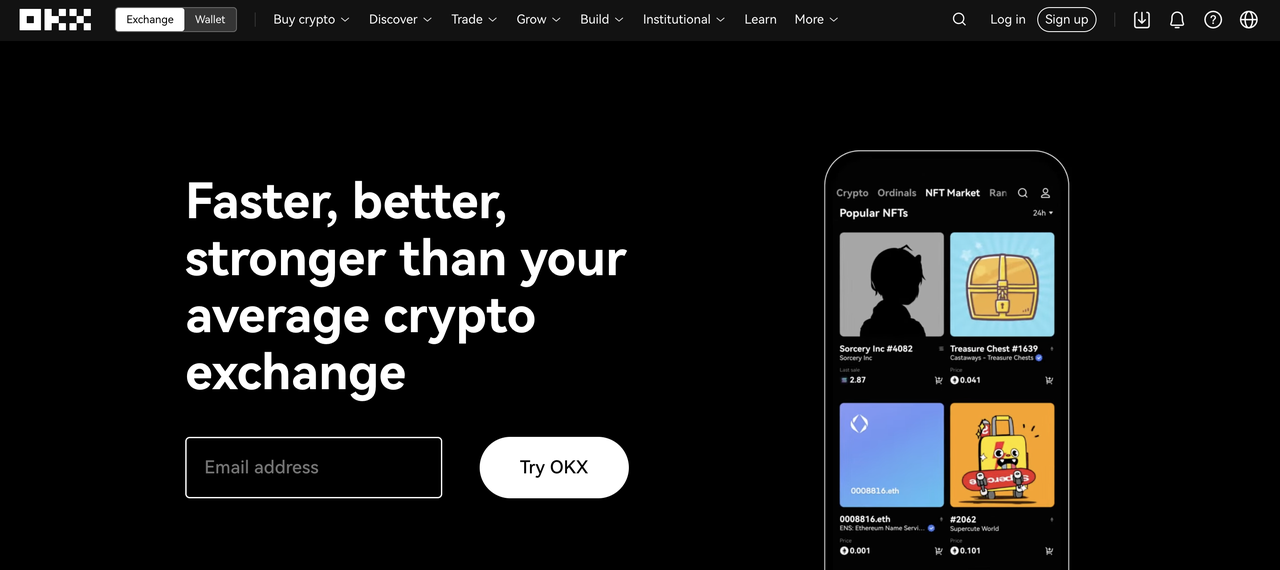
OKX has been applying for a cryptocurrency license in Hong Kong since 2022 and has formed a dedicated team of over 20 people to oversee the compliance process in Hong Kong. The team members come from the SFC, SEC, international law firms, or licensed financial institutions.
Currently, OKX has established a physical presence in Hong Kong, offering virtual asset services in Hong Kong, and is planning to apply for a virtual asset service provider license in accordance with the "2022 Anti-Money Laundering and Counter-Terrorist Financing (Amendment) Ordinance" (which will take effect on June 1, 2023), as well as applying for Type 1 and Type 7 licenses under the Securities and Futures Ordinance.
Bitget
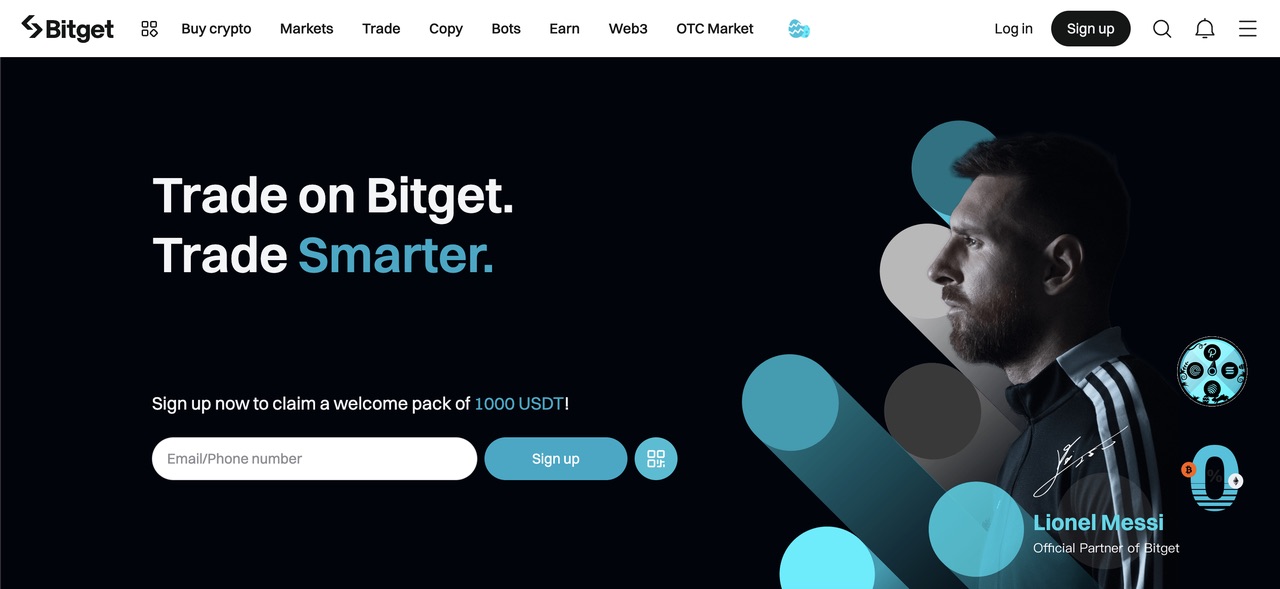
Bitget hired lawyers and compliance professionals in Hong Kong at the end of 2022 to further understand all relevant Hong Kong policies and is preparing to apply for a virtual asset trading platform license in Hong Kong.
Huobi Global
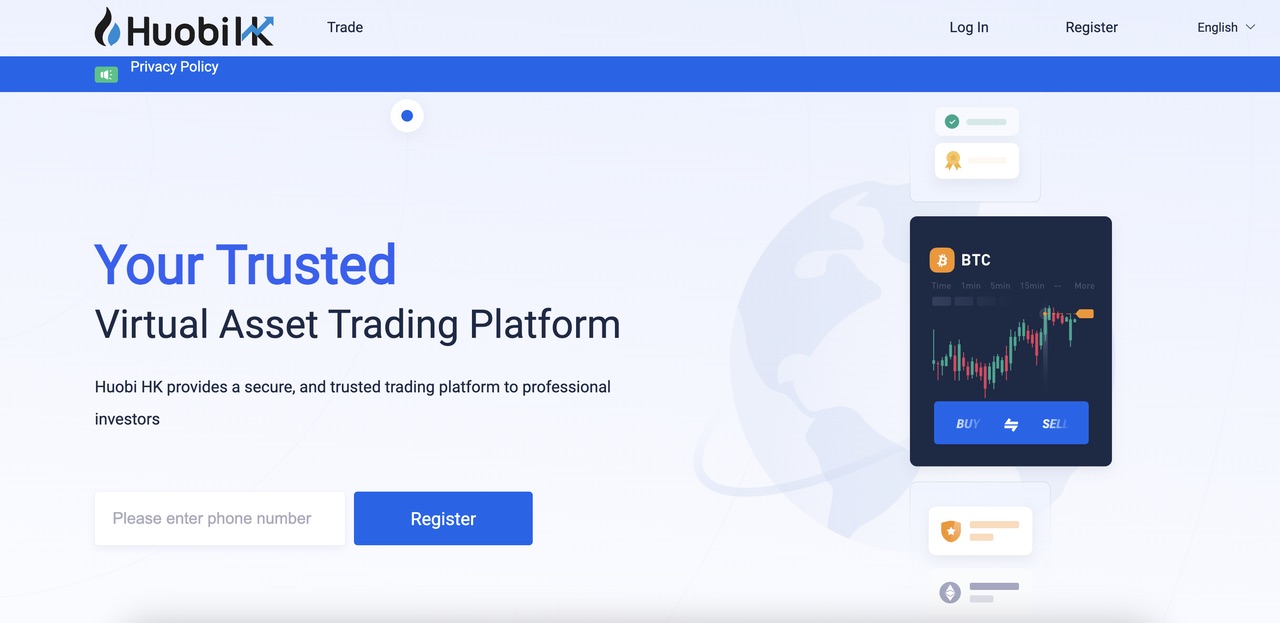
In an interview with Bloomberg, Justin Sun stated that Huobi Global has applied for a cryptocurrency trading license in Hong Kong and will be able to expand its services and products to Hong Kong customers, offering a wider range of cryptocurrency trading and investment options. Currently, Huobi has launched a new exchange, Huobi HK, in Hong Kong, providing spot trading and virtual asset custody services.
Gate.io
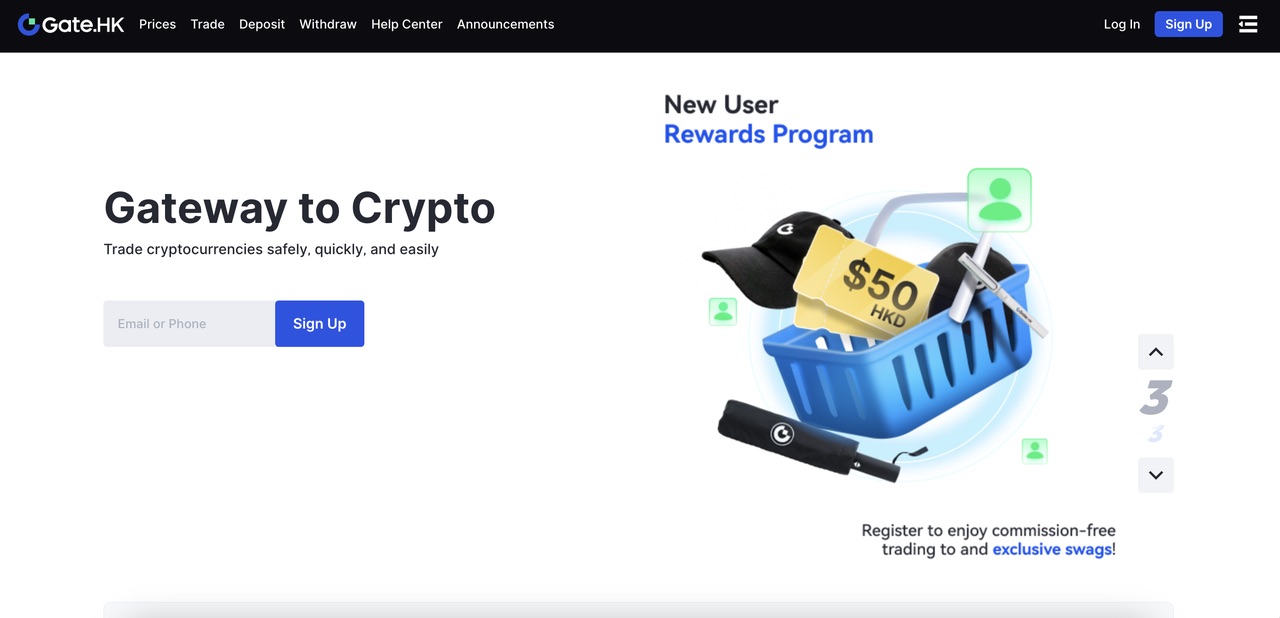
Gate.io's subsidiary, Hippo Financial Services, has obtained a virtual asset custody license in Hong Kong, allowing it to provide virtual asset custody services in Hong Kong. Gate has also obtained a Trust and Company Service Provider (TCSP) license in Hong Kong, enabling it to provide a range of custody solutions for digital assets in Hong Kong. Its parent company, Gate Group, is currently applying for a new cryptocurrency license in Hong Kong and launching a new platform, Gate HK, designed for the Hong Kong market.
BitMart
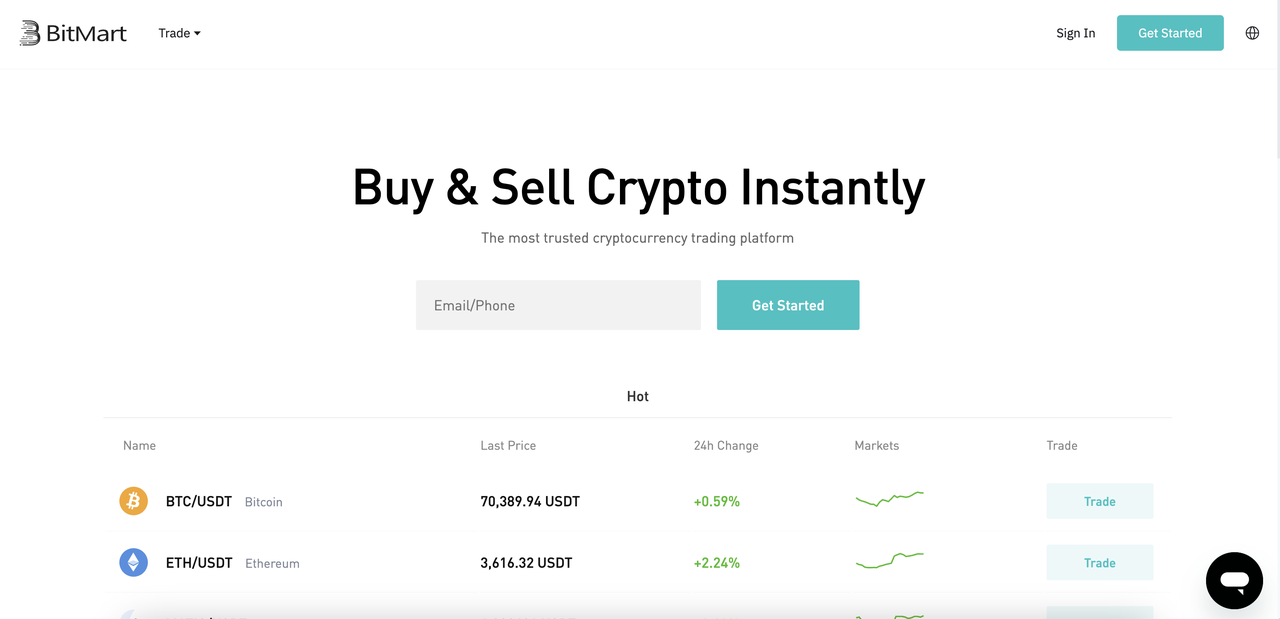
In May 2023, BitMart announced the official launch of its trading platform "BitMart Hong Kong" to continue serving institutional and retail investors in Hong Kong. Currently, BitMart Hong Kong supports spot trading of virtual assets such as Bitcoin, Ethereum, and LTC.
4. Web3 Projects in Hong Kong
As a financial center, Hong Kong is actively promoting the implementation, compliance, and introduction of resources and talent in the Web3 and cryptocurrency industry. However, due to natural limitations, there are not many Web3 projects in Hong Kong, and some of these projects may outsource their technical or marketing teams to Shenzhen or Kuala Lumpur.
MAMORI
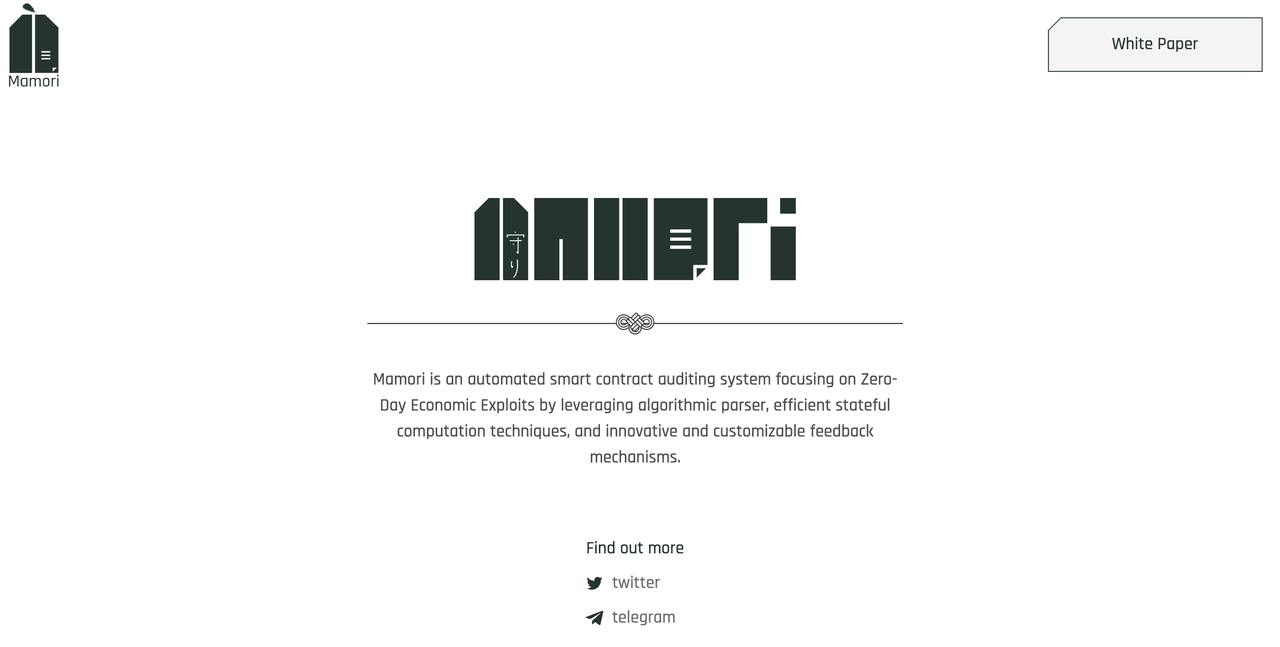
Mamori is an intelligent contract audit system based on Web3 algorithms, focusing on zero-day economic vulnerabilities and MEV, addressing scalability, automation, vulnerability detection relevance, and efficiency in the Web3 security field. Their goal is to apply interdisciplinary technology and prevent "unknown unknown" vulnerabilities. To achieve this goal, they use algorithmic parsing technology to build intelligent contract sequences, utilize reproducible stateful computing technology, and integrate innovative, customizable algorithm feedback mechanisms.
Ladder
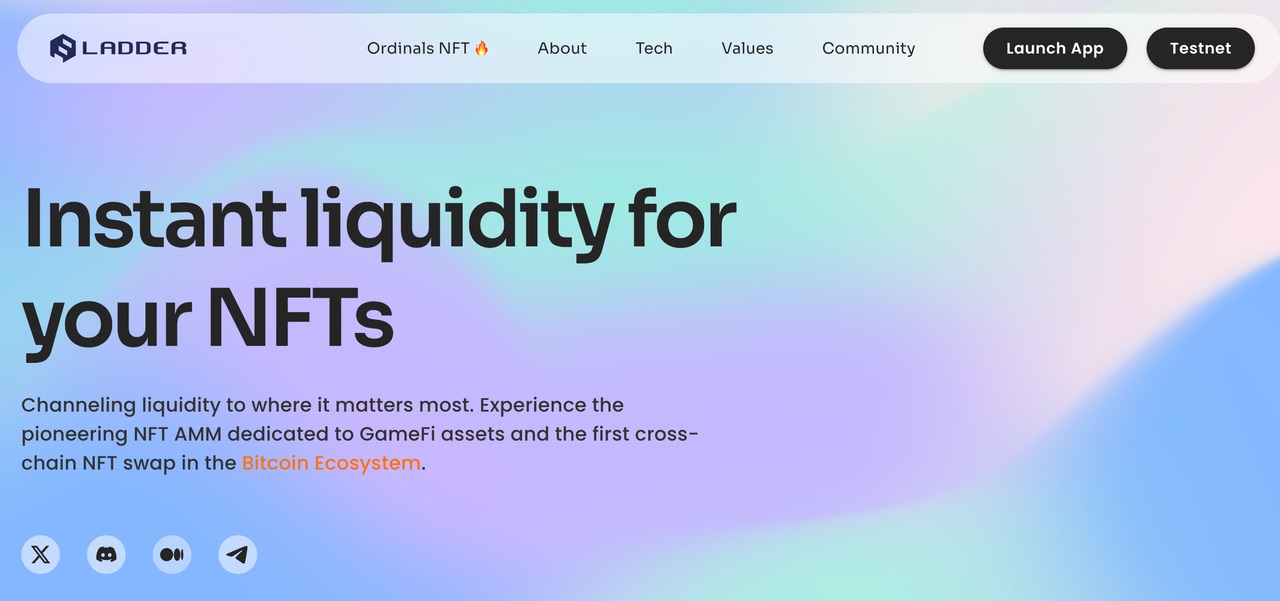
Ladder is a decentralized automated market maker (AMM) protocol that specifically provides instant exchange services using liquidity pools for NFT usage. While Ladder primarily targets the GameFi sector, they support all major token standards, including ERC-721, ERC-1155, ERC-3525, ERC-20, and more.
Yuliverse

Yuliverse is a blockchain-based play-to-earn game that combines elements of GameFi and SocialFi with its NFTs, cryptocurrencies, ARG, and ART. It provides players with a "earn-as-you-play" mechanism for gaming experience. The game aims to promote social participation and interaction, providing players with the opportunity to explore the real world and connect with local businesses. By completing tasks and challenges, players can earn two native tokens, which play an important role in the Yuliverse ecosystem.
Conflux Network
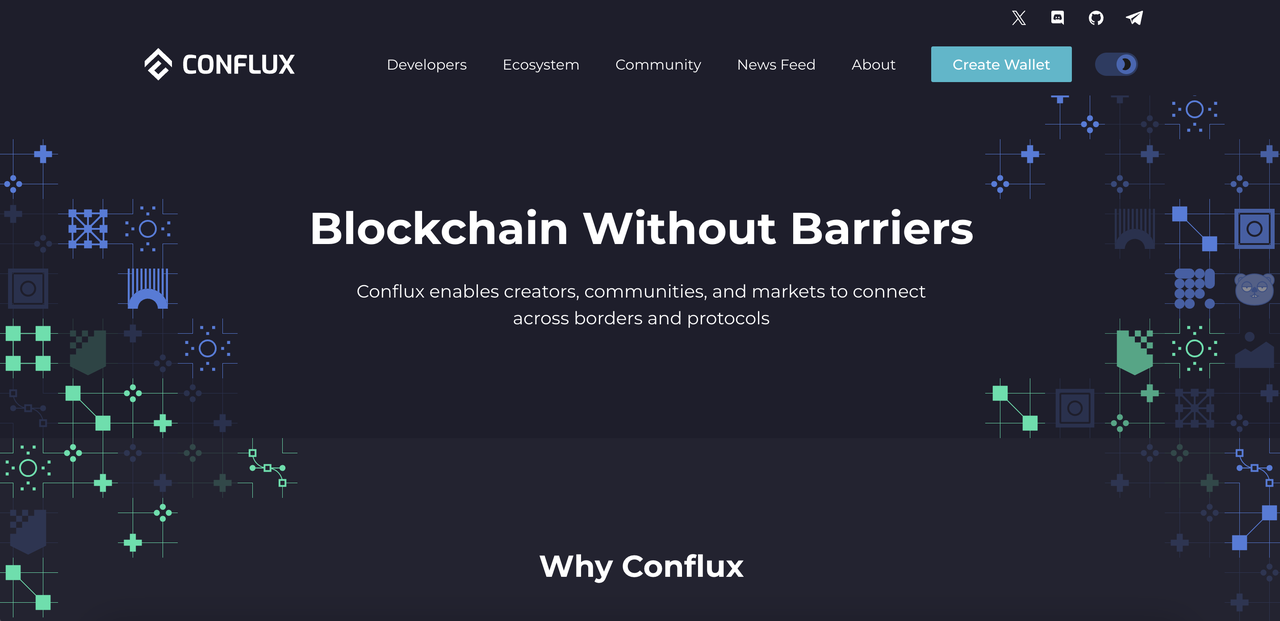
Conflux is a high-performance Layer1 blockchain designed for dapps that require large-scale speed while ensuring decentralization. Conflux's tree-graph structure can confirm multiple blocks simultaneously, reducing confirmation time and significantly increasing transaction throughput. As a compliant and permissionless public chain in China, Conflux is building a borderless trading and technology ecosystem for crypto projects with a global mindset, expanding from China to North America, Russia, Latin America, Europe, Africa, and other parts of the world.
Element
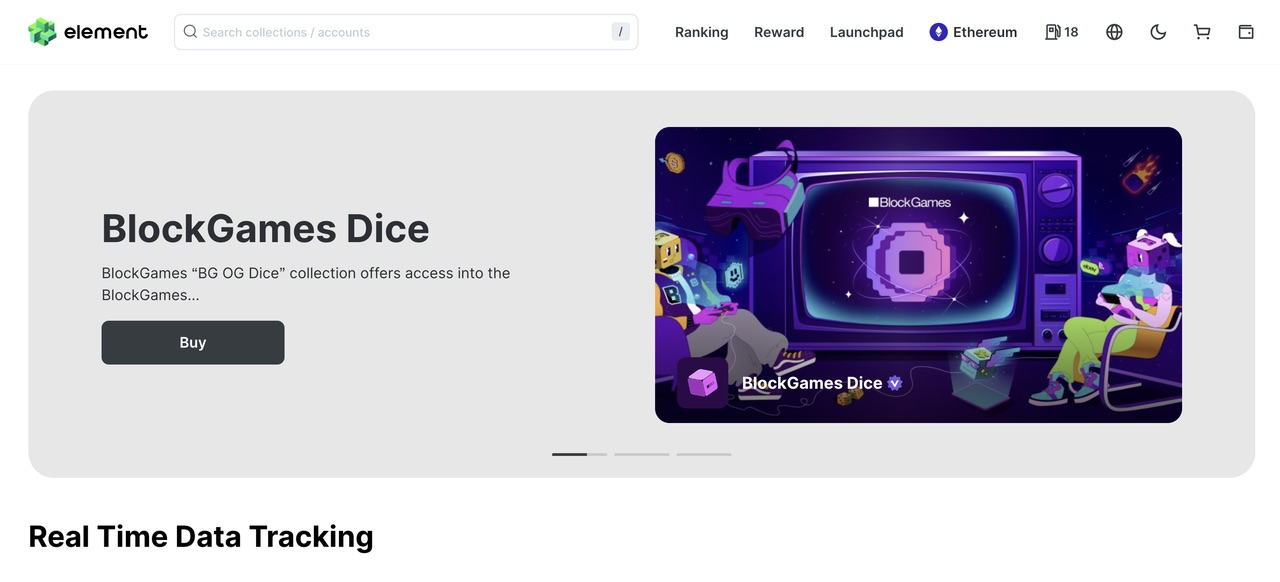
Element is a multi-chain aggregated NFT marketplace aimed at building a community-driven integrated market with the best trading experience and lowest entry barriers. Element provides partners with exclusive pages, collection authentication, and launchpad services to facilitate project development and participation. Element has been early in the Hong Kong market, and many multinational consumer goods companies have a demand for issuing NFTs.
The Sandbox

The Sandbox, founded in 2012, is one of the leading projects in the metaverse concept, a decentralized, community-driven gaming ecosystem where players can create NFTs, upload them to the in-game marketplace, and teleport them into the game. The project has raised funds twice, with a total amount of $95.1 million, with major investors including SoftBank Vision Fund, Animoca Brands, Blue Pool Capital, Polygon Labs, Liberty City Ventures, Samsung Nex, and others.
5. Cryptocurrency Venture Capital in Hong Kong
Although Hong Kong may be lagging behind in Web3 policies, it remains one of the strongest cities in Asia, and many cryptocurrency giants have originated in Hong Kong. In recent years, many new blockchain startups and cryptocurrency investment institutions have emerged in Hong Kong, demonstrating the potential for incubating Web3 projects in the region. These investment institutions leverage their industry resources to facilitate client connections, resource import, and technical support for enterprises or projects, highlighting their importance in strategic implementation and industry development.
Cyberport

Cyberport, managed by the Hong Kong SAR Government, is a digital technology center and incubator in Hong Kong. It has over 2,000 members, including 900 startups and tech companies on-site and nearly 1,100 off-site. Cyberport is dedicated to driving Hong Kong's digital economy, nurturing talent, promoting youth entrepreneurship, supporting startups, and fostering industry collaboration for digital transformation.
HASHKEY Capital
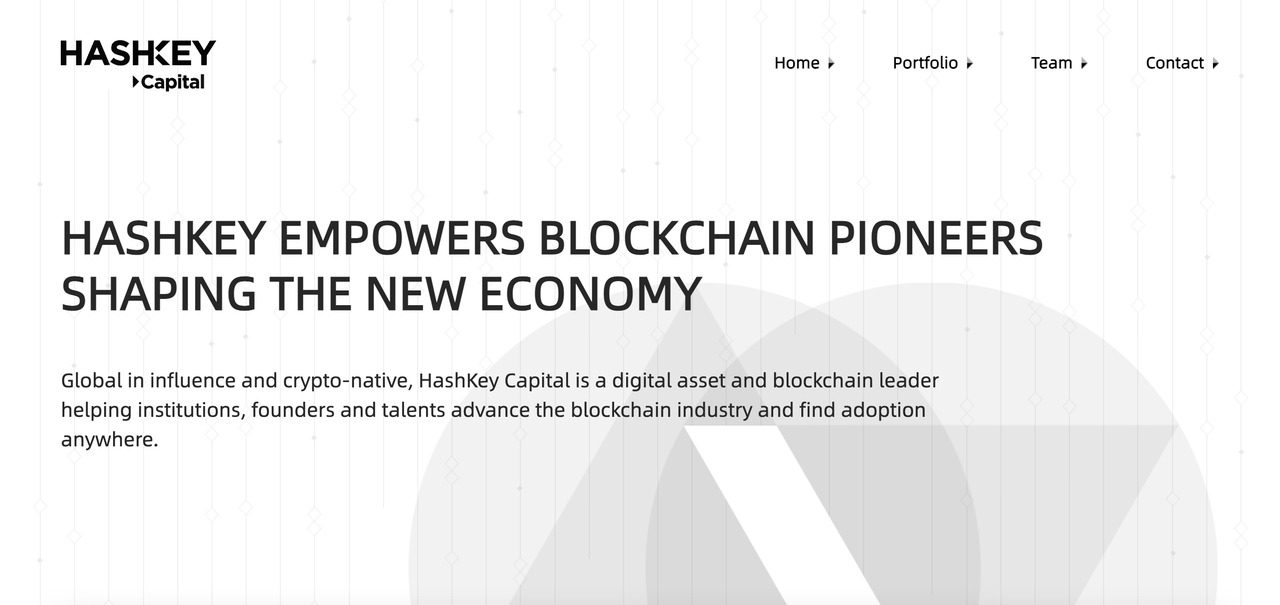
Headquartered in Hong Kong with branches in Singapore, Japan, the United States, and other locations, HashKey Capital is a leading blockchain investment company with over $1 billion in assets under management. As one of the most influential blockchain investment institutions in Asia and an early institutional investor in Ethereum, it primarily invests in blockchain technology, digital assets, and cryptocurrency-related projects.
HashKey Capital provides funding, strategic guidance, and support to promising blockchain startups and projects, as well as advisory services to institutional investors seeking exposure in the blockchain and cryptocurrency markets, playing a crucial role in driving innovation and growth in the blockchain ecosystem.
Amber Group
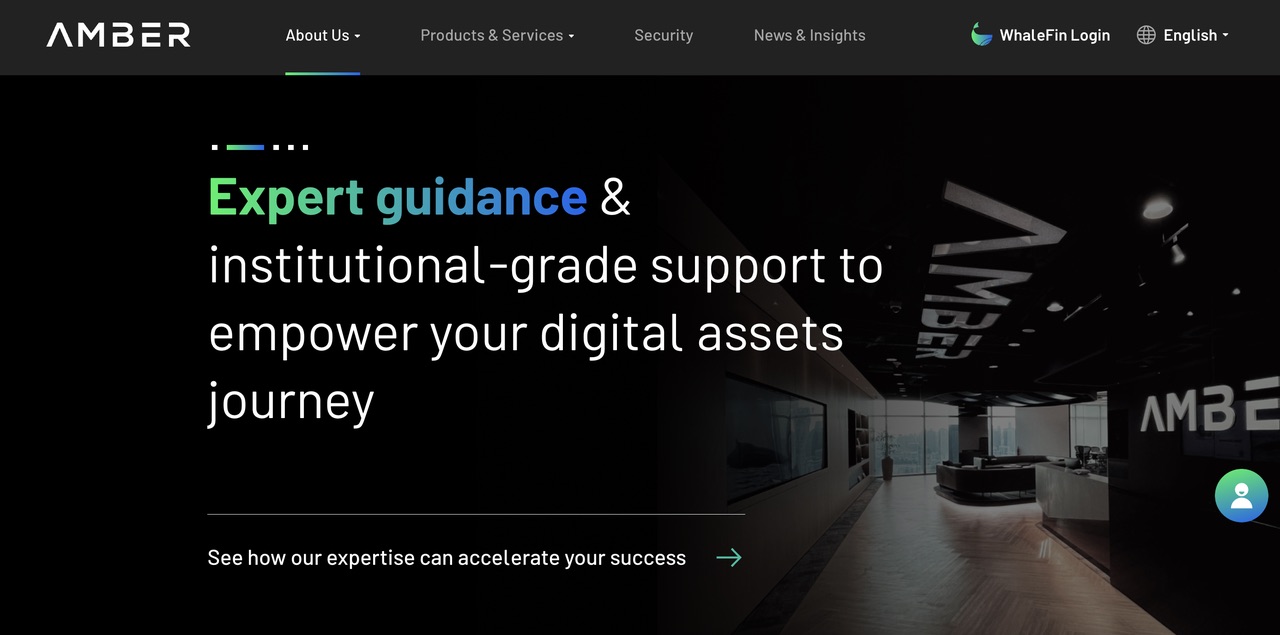
Amber Group is a leading digital finance technology platform, known for its trading services and as a prominent institutional investor in the primary market. With rapid business growth and the background of its founding team, Amber has secured significant funding from top investment firms, including Temasek, Sequoia China, Pantera Capital, Tiger Global Management, Fenbushi Capital US, and others.
Amber Group's portfolio includes investments in projects such as public chain NEAR Protocol, decentralized staking protocol StaderLabs, decentralized staking protocol SSV.Network, algorithmic stablecoin project Sperax, Aurora native lending protocol Aurigami, lightweight public chain Mina, Japanese blockchain gaming startup doublejump.tokyo, and Web3 infrastructure company EthSign.
IOSG Ventures

IOSG Ventures is an investment and research company focused on the blockchain/crypto field, covering multiple blockchain verticals such as infrastructure, DeFi, GameFi, and SocialFi. According to its official website, it emphasizes the breakthrough and innovation of projects, the ambition and resilience of founders and teams, outstanding operational and delivery capabilities, and a focus on community building when making investments.
IOSG primarily focuses on investing in Layer1 projects and has become one of the major investors in Polkadot and Near Protocol. It has invested in many well-known projects, including 0x, 1inch.exchange, DeFi Alliance in the DeFi sector, and Conflux, Cosmos, Mina Protocol in the Layer-1 sector.
Animoca Brands
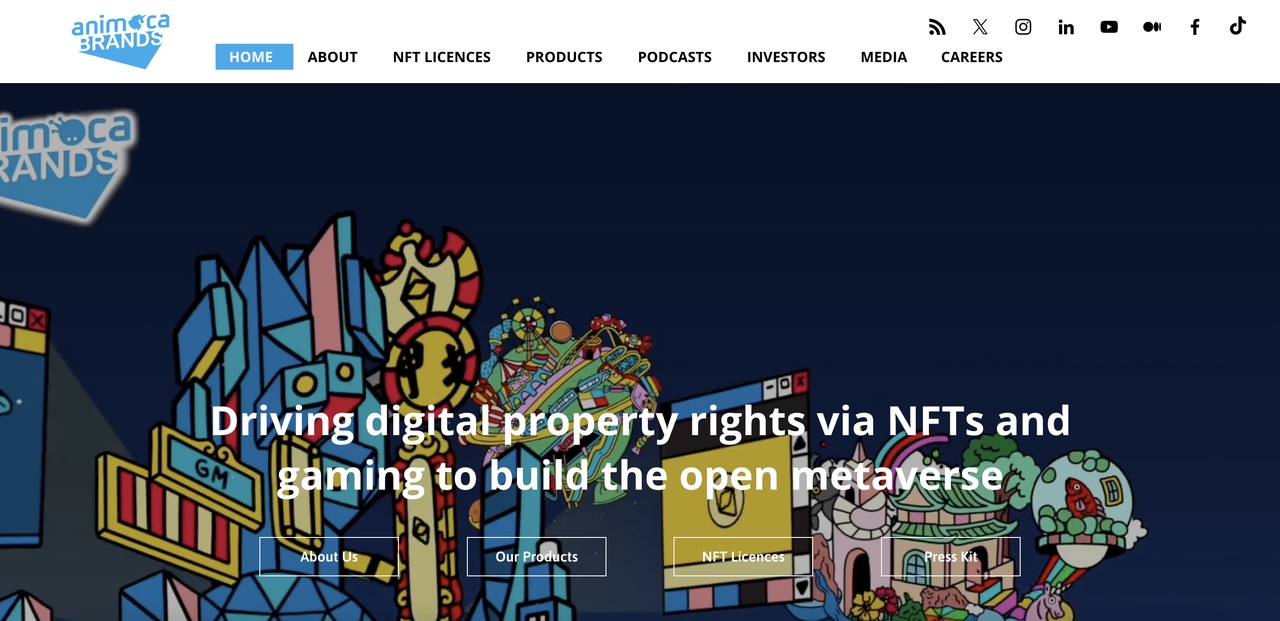
Animoca Brands is a recipient of the Deloitte Tech Fast award, one of the "Fortune" Top 40 Cryptocurrency Companies, and one of the high-growth companies in the Asia-Pacific region according to the Financial Times in 2023. It leverages blockchain to provide digital property to consumers worldwide, helping to build an open virtual universe. Animoca Brands is one of the most active investors in Web3, with over 400 Web3 investments directly or through Animoca Ventures, including Yuga Labs, Axie Infinity, Polygon, Consensys, Magic Eden, Fireblocks, OpenSea, Dapper Labs, and Yield Guild Games.
C Capital

C Capital is a global asset management company that manages private equity funds, private credit funds, and blockchain hedge funds. It was founded in 2017 by Hong Kong real estate tycoon Zheng Zhigang, Clive Ng, and Ben Cheng. Its Blockchain Market Fund is a fully delegated long/short hedge fund focused on investing in the blockchain space, providing investors with a range of cryptocurrency trading strategies through technical analysis, fundamental analysis, and on-chain analysis.
C Capital has invested in over 60 companies to date, covering consumer, technology, and blockchain sectors. Its investments in the blockchain and digital asset space include Ethereum infrastructure development company ConsenSys, financial services platform Matrixport, NFT virtual fashion brand RTFKT, and Animoca Brands.
Everest Ventures Group

Everest Ventures Group, also known as EVG, is a blockchain investment bank and incubator spun off from the Hong Kong private equity/venture capital fund Pionex Capital, aiming to drive the mass adoption of digital assets and blockchain technology. EVG focuses on fintech, DeFi infrastructure, NFT, GameFi, Web3, and metaverse.
EVG's investment portfolio includes many well-known projects such as blockchain game and NFT developer Animoca Brands, decentralized metaverse The Sandbox, public chain Flow, and crypto exchange Kraken. In addition to investment and financing, EVG also builds many companies for GameFi, film and television NFT, and will have more layouts in the metaverse in the future.
GBV Capital

GBV Capital is an investment institution under Genesis Block, focusing on risk funds for blockchain technology and digital assets in Asia, primarily operating cryptocurrency over-the-counter trading in Hong Kong. The GBV team provides full-stack collaboration with projects, aiming to facilitate project development through marketing, trading functions, products, and strategically focused team members.
Since its establishment in 2020, GBV has invested in over 70 companies, covering multiple verticals, including Layer2 public chain Boba Network, Layer2 money market protocol zkLend, DeFi startup Arch, crypto options trading platform SignalPlus, P2E shooting game Cantina Royale, and Web3 creator collaboration platform Joyn.
Newman Capital

Newman Capital is a full-stack venture capital firm focusing on technology investment in private equity, blockchain startups, and art and collectibles investment. Its key investment areas include core infrastructure, decentralized finance, social, and gaming.
According to its official website, Newman's team has supported over 60 projects, including well-known crypto projects such as NFT unicorn Yuga Labs, crypto exchange Kraken, Ethereum scaling and infrastructure development platform Polygon, and Dapper Labs, as well as early investments in well-known internet and technology companies such as Reddit, SpaceX, and Epic Games.
MindWorks Capital
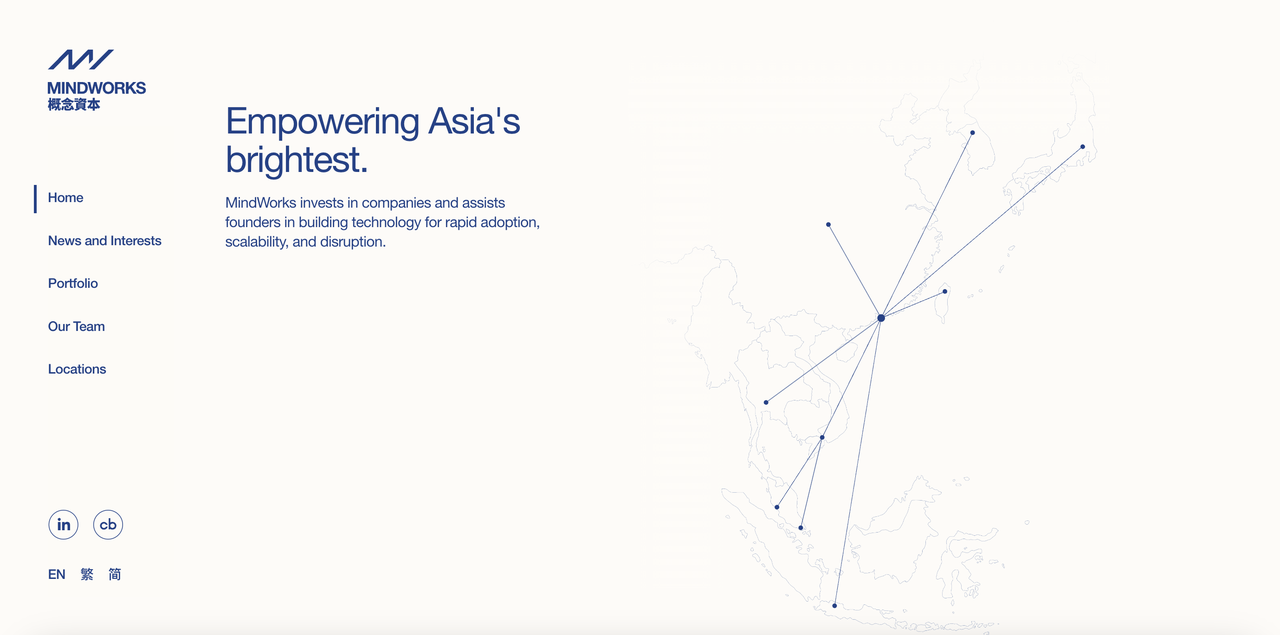
MindWorks Capital is headquartered in Hong Kong, with offices in Beijing, Shanghai, and Jakarta, and its investment portfolio spans the Greater China and Southeast Asia regions. It is a venture capital firm that focuses on early-stage and seed investments.
MindWorks Capital manages funds from university endowments, global asset management companies, parent funds, family offices, and leading new economy entrepreneurs in Asia. It has invested in 33 projects, including several blockchain startups such as YGGSEA under the YGG guild, crypto exchange Zipmex, on-chain data monitoring platform PARSIQ, and composite asset protocol Starfish Finance.
6. Regulatory Framework for the Cryptocurrency Market
The Financial Services and the Treasury Bureau (FSTB) of Hong Kong officially released the "Policy Statement on the Development of Virtual Assets in Hong Kong" on October 31, 2022, expressing the Hong Kong government's open, inclusive, and innovative attitude towards public participation in virtual asset trading, protection of tokenized asset ownership, and the development of stablecoins. The Hong Kong government has also actively participated in three experimental programs, including NFT issuance, green bond tokenization, and the Digital Tech Hub Dollar, to test the technological benefits of virtual assets and explore further applications in the financial market.
In recent years, the virtual asset industry has been booming, with various innovative technologies and applications emerging. Regulatory authorities in various jurisdictions around the world are closely following suit, aiming to regulate the industry's development and find new engines of growth for the local economy. Regulatory bodies such as the Securities and Futures Commission (SFC), the FSTB, and the Hong Kong Monetary Authority (HKMA) have issued a series of statements, circulars, position papers, and legislative consultations to gradually build a regulatory framework for virtual assets in Hong Kong.
6.1 Regulatory Agencies and Responsibilities
Financial regulation in Hong Kong is mainly carried out by the Financial Services and the Treasury Bureau (FSTB), the Hong Kong Monetary Authority (HKMA), the Securities and Futures Commission (SFC), and the Insurance Authority (IA).
The Treasury Bureau plays a managerial role in financial regulation, formulating financial policies and submitting legislative proposals;
The Hong Kong Monetary Authority is mainly responsible for maintaining the stability of the financial system and the banking industry, as well as managing foreign exchange reserves to maintain the stability of the Hong Kong dollar;
The Securities and Futures Commission is responsible for supervising and promoting the development of the securities and futures markets and can issue licenses for regulated activities;
The Insurance Authority supervises the insurance industry, protects policyholders' interests, and promotes the stable development of the insurance industry;
In addition, the Hong Kong Association of Banks, the Hong Kong Stock Exchange, and the Hong Kong Federation of Insurers act as industry self-regulatory organizations for the banking, securities, and insurance industries, respectively, to conduct industry regulation. This multi-level regulatory system not only controls financial risks but also greatly stimulates the creativity and enthusiasm of the financial market, thereby promoting the stable development of the Special Administrative Region's economy.
Regarding the regulation of crypto assets and the crypto industry, Hong Kong does not have a separate regulatory authority. Instead, several financial regulatory agencies have issued guidance documents on this topic, including the Securities and Futures Commission (SFC) and the Hong Kong Monetary Authority (HKMA).
6.2 Regulatory Progress Timeline
In September 2017, the "Statement on Initial Coin Offerings" was issued, requiring ICOs to apply for a license from the Securities and Futures Commission in Hong Kong;
In December 2017, the "Circular to Licensed Corporations and Registered Institutions on Bitcoin Futures Contracts and Cryptocurrency-Related Investment Products" was issued;
In November 2019, Hong Kong began regulating cryptocurrency exchanges, requiring CEXs to obtain a license to provide services to investors;
In June 2022, the "Notice to Investors on NFT Risks" was issued, mentioning that most NFTs are intended to represent their related assets;
In October 2022, the FSTB issued the "Policy Statement on the Development of Virtual Assets in Hong Kong," expressing Hong Kong's open and inclusive attitude towards virtual assets;
In December 2022, the Legislative Council of Hong Kong passed the "Anti-Money Laundering and Counter-Terrorist Financing (Amendment) Ordinance 2022";
In January 2023, the "Discussion Paper on Crypto Assets and Stablecoins" was issued, requiring stablecoins to be fully backed and allowing face value redemption;
In February 2023, the SFC issued a consultation paper on proposed regulatory requirements for virtual asset trading platform operators;
In May 2023, the "Guideline on Anti-Money Laundering and Counter-Terrorist Financing" was issued;
In June 2023, the Virtual Asset Service Providers (VASP) licensing system was implemented;
In August 2023, the Hong Kong government announced that listed exchanges can sell to retail investors;
In January 2024, the "Strategic Focus for 2024-2026" was published, highlighting the focus on technology innovation centered around crypto.
6.3 Classification of Financial Licenses
The Securities and Futures Commission issues ten types of financial licenses:
License 1: Securities trading, providing brokerage services for stocks, stock options, and bonds, as well as distributing mutual funds and unit trust funds;
License 2: Futures contract trading, providing brokerage services for index or commodity futures;
License 3: Leveraged foreign exchange trading, providing foreign exchange trading services;
License 4: Securities investment advisory, providing securities investment advice and research analysis reports;
License 5: Futures contract investment advisory, providing investment advice and research analysis reports for futures contracts.
License 6: Corporate finance advisory, acting as a sponsor for initial public offerings and providing advice on compliance and other matters related to company listings;
License 7: Automated trading, providing electronic trading platform services for order matching operations;
License 8: Margin financing, providing stock pledge financing services;
License 9: Asset management, providing full discretionary fund management and securities and futures contract investment management services;
License 10: Credit rating, allowing for the rating of corporate, bond, and sovereign credit.
Among these licenses, the most critical are License 1 and License 7 (securities trading and providing automated trading services), which are necessary conditions for compliant exchange operations. License 9 is also a focus of the market, as it is a requirement for custodial user funds, which is necessary for private or public funds, but not currently required for exchanges. Currently, OSL and HashKey have obtained License 1 and License 7, and Huobi Technology has obtained License 9.
6.4 Requirements and Safeguards for CEX Operations
Regarding the operation of CEX platforms, according to the documents published by the Securities and Futures Commission in Hong Kong, the requirements are as follows:
CEX operators must maintain a fully paid-up capital of not less than HK$5 million at all times;
CEX operators must hold assets with sufficient liquidity in Hong Kong, such as cash, deposits, government bonds, and certificates of deposit (but not virtual assets), equal to at least 12 months of actual operating expenses calculated on a continuous basis;
CEX operators must establish and implement strict internal control measures and governance procedures for private key management to ensure the secure generation, storage, and backup of all cryptographic seeds and private keys, with the seeds and private keys stored in Hong Kong;
6.5 ETF Policies and Regulatory Requirements
On December 22, 2023, the Hong Kong Monetary Authority and the Securities and Futures Commission jointly issued an updated "Joint Circular on Virtual Asset-Related Activities of Intermediaries," indicating readiness to accept applications for virtual asset spot and futures ETFs and proposing regulatory requirements:
On the same day, the SFC issued the "Circular on SFC-Approved Funds Investing in Virtual Assets" ("ETF Circular"). The ETF Circular replaces the circular on virtual asset futures ETFs issued by the SFC on October 31, 2022, and sets out new regulatory requirements for virtual asset ETFs (including futures and spot ETFs):
Qualifications of the manager: The manager of the ETF should have a good regulatory compliance record, at least one competent staff member with experience in managing virtual assets and related products, and hold an upgraded License 9;
Underlying assets: The ETF can only invest (directly or indirectly) in assets tradable on licensed exchanges in Hong Kong;
Investment strategy: The ETF is not allowed to use leverage at the fund level;
Subscription and redemption: The SFC allows subscriptions and redemptions to be made in cash (in-cash) or in-kind (in-kind);
Custody arrangements: The assets held by the ETF must be custodied by a licensed exchange in Hong Kong or a financial institution and its subsidiaries approved by the HKMA;
6.6 Regulation and Legislation for Stablecoin Issuance
Stablecoins are pegged to specific assets (such as fiat currency, gold, etc.), have minimal price fluctuations, and play the role of "currency" in the crypto market. The Hong Kong government is very concerned about the development of stablecoins and is actively promoting related legislation:
The plan is to introduce new legislation rather than amend existing legislation (e.g., the Payment Systems and Stored Value Facilities Ordinance (Cap. 584) or the Anti-Money Laundering and Counter-Terrorist Financing Ordinance (Cap. 615));
The proposed regulatory regime for stablecoins only applies to fiat-referenced stablecoins (FRS), which are cryptographic representations of value that maintain a relatively stable value relative to one or more fiat currencies;
Issuing FRS in Hong Kong, issuing FRS pegged to the Hong Kong dollar in any jurisdiction, or actively promoting the issuance of FRS to the Hong Kong public requires an FRS issuer license;
Key licensing conditions and regulatory requirements for FRS issuers include requirements related to reserve assets and stability mechanisms, redemption of FRS at face value in the reference currency, and obtaining HKMA approval before any new business;
Only FRS issued by an FRS issuer licensed by the HKMA can be sold to retail investors; all other types of FRS can only be sold to professional investors;
From the policy documents issued by institutional departments, the main regulatory focus is on anti-money laundering and investor protection. It draws on traditional financial regulatory thinking, adhering to the principle of "same business, same risk, same rules" in regulation, preventing legitimate financial activities from becoming tools for money laundering, terrorist financing, and other criminal activities, and maximizing investor protection to minimize substantial asset losses caused by non-compliant or even illegal behavior of trading platforms and allowing investors to invest in targets that do not match their risk tolerance.
7. Conclusion
Hong Kong has been strategically positioned in the blockchain industry for a long time. Since the launch of the "Fintech Challenge" in 2018, which encourages local companies to participate in the development of technologies such as blockchain, Hong Kong's financial technology companies have exceeded 600, including mobile payments, cross-border wealth management, wealth and investment management, compliance technology, and cryptocurrency trading. Hong Kong has also launched cryptocurrency ETFs and has continuously hosted several large-scale blockchain industry summits.
With the rise of blockchain technology, as a traditional global financial center, Hong Kong is actively exploring how to maintain its position in the world of Web3, fully leveraging its unique advantages as a financial center. It has become a hotspot for blockchain and digital asset activities and more and more companies are choosing to establish institutions or subsidiaries in Hong Kong.
The characteristics of the financial industry in Hong Kong are a strong regulatory framework, sound infrastructure, and openness to foreign investment. This is also reflected in the crypto industry, with corresponding regulatory policies becoming increasingly clear. By establishing a clear regulatory framework, a favorable environment for digital asset activities is created, leveraging the opportunities brought by the growing digital asset market to continuously empower a broader financial technology ecosystem.
In the rapidly changing crypto market environment, Hong Kong's unique position and governance environment give it tremendous potential to become the hub of the Chinese market. With further policy promotion and implementation, the focus of the Chinese market, the Asia-Pacific market, and the global market is converging on Hong Kong. Its advantages as a financial center are being amplified and unleashed in the crypto field. We have reason to believe that Hong Kong's position in the crypto market will become increasingly important and will become the hub and driving force of the crypto industry.
Note: All the above views are for reference only and should not be considered as investment advice. If there are any objections, please feel free to contact us for corrections.
免责声明:本文章仅代表作者个人观点,不代表本平台的立场和观点。本文章仅供信息分享,不构成对任何人的任何投资建议。用户与作者之间的任何争议,与本平台无关。如网页中刊载的文章或图片涉及侵权,请提供相关的权利证明和身份证明发送邮件到support@aicoin.com,本平台相关工作人员将会进行核查。



